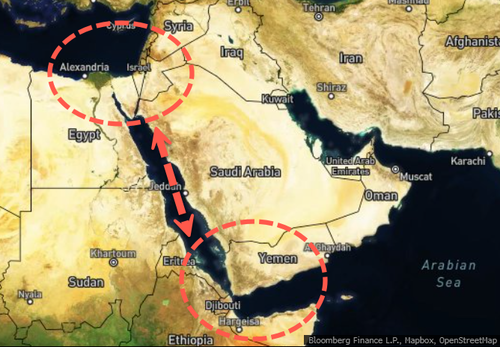Houthis Warn Drone & Missile Attack Coverage Expanding To Mediterranean Sea
Yahya Saree, spokesperson for the Iranian-backed Houthi terror group, declared in a televised speech to supporters at a Friday rally in Al-Sabeen Square, Sana, that they intend to target Israel-linked ships in the eastern Mediterranean. The risk of conflict spilling over from the Red Sea and Gulf of Aden remains high.
“We will target any ship heading to Israeli ports in the Mediterranean, in any area we are able to reach,” Saree said.
Given that the eastern Mediterranean is 1,900 kilometers (1,180 miles) from Yemen, this may indicate that the conflict area is broadening, triggering a new escalation of the multi-month war.
Fernando Ferreira, energy analyst at Rapidan Energy Group, noted:
“The Houthi nuisance continues, but they are at the limit of their ability to cause disruptions. The real risk of escalation comes from Israeli retaliation on IRGC officers/assets helping the Houthis.”
This comes as Houthis have attacked dozens of Western and Israel-linked commercial vessels and military ships across the southern Red Sea, Bab al-Mandab Strait, Gulf of Aden, and even the Strait of Hormuz since last November. The group claims these maritime attacks are in solidarity with the Palestinians in Gaza.
Saree warned if the Israel Defense Forces launched an attack on the southern Gaza city of Rafah, where hundreds of thousands of Palestinians are sheltering from the seven-month-long war. They would’ve no other choice but to impose sanctions on all ships of the companies that are supplying Israel and entering Israeli ports.
What’s clear—and the West won’t like it—is that the Houthis appear to be expanding their attack coverage as numerous maritime chokepoints in the region are under constant threat.
We pointed out Thursday that Operation Prosperity Guardian, the US-led maritime coalition launched by the Biden administration earlier this year, has been largely a failure.
Maritime traffic data from Bloomberg shows not one single LNG vessel with destinations to Europe and the US was transiting the Red Sea for fear of being attacked by Houthi drones and missiles.
Conflict spillover risks are mounting in the Middle East. Yet the war risk premium in Brent crude has been subsiding in recent weeks.
Tyler Durden
Fri, 05/03/2024 – 17:20

